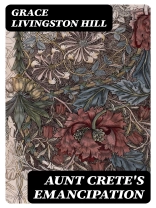In ‘Aunt Crete’s Emancipation, ‘ Grace Livingston Hill crafts a touching narrative that explores themes of personal growth, social emancipation, and the enduring power of love. Employing a distinctive combination of sentimental prose and keen psychological insight, Hill paints a vivid portrait of her protagonist, Aunt Crete, who embarks on an enlightening journey of self-discovery amid societal constraints. The novel reflects the early 20th-century zeitgeist, capturing the tensions between traditional values and evolving perspectives on gender roles, thereby situating it within the larger context of American literature that sought to address the complexities of women’s identities in a rapidly changing world. Grace Livingston Hill, renowned for her prolific contribution to Christian literature, brought her own life experiences and values to bear in her writing. An advocate for women’s empowerment through faith, Hill often infused her narratives with moral lessons drawn from her own upbringing in a devout family. Her familiarity with the struggles faced by women in her era inspired the creation of Aunt Crete, reflecting her belief in the transformative power of love and self-acceptance. Readers seeking a heartwarming tale that transcends the mundane will find ‘Aunt Crete’s Emancipation’ a compelling and enlightening read. Hill’s ability to weave intricate emotional landscapes, combined with her poignant exploration of personal liberation, makes this novel a significant contribution to both feminist literature and sentimental fiction. This book is not only a celebration of personal agency but also a reminder of the enduring spirit that propels individuals towards freedom and fulfillment.
关于作者
Grace Livingston Hill (1865–1947) was a prolific American writer during the early 20th century, renowned for her work in the Christian Romance fiction genre. Born into a Presbyterian minister’s family, Hill was influenced by her religious upbringing, which became a cornerstone of her literary work. She attended school in Pennsylvania and pursued an active role in religious activities, later channeling her experiences and values into her writing. With over 100 novels and numerous short stories to her credit, Hill dignified the Christian romance genre with her wholesome storytelling and inspirational themes.
Her novel ‘Aunt Crete’s Emancipation’ is a testament to Hill’s narrative charm and her ability to weave morality with entertainment. The story is centered around Lucretia ‘Crete’ Ward, a Cinderella-like character, whose life takes an unexpected turn towards independence and happiness. Typical of Hill’s works, this novel emphasizes the virtue of kindness and the transformative power of Christian faith in everyday life.
Hill’s literary style is marked by its accessibility and encouragement of moral reflection, often featuring female protagonists who navigate through societal and personal challenges. Her stories are constructed with a clear dichotomy of good versus evil, aiming to uphold Christian moral values and virtues. Grace Livingston Hill’s legacy endures not only in Christian fiction circles but also through her influence on the development of the formulaic patterns found in modern romantic literature.












